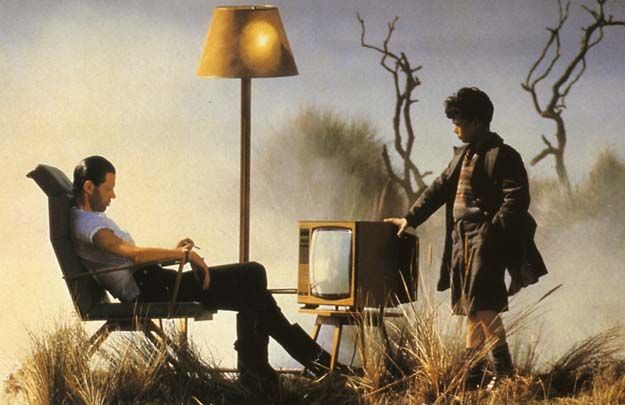
Pink Floyd are not what they once were. The absence of bassist and co-frontman Roger Waters notwithstanding, 2015’s The Endless River sent what remained of the band out to pasture in indulgent, self-reverential tones. What may very well be the last Floyd album is a far cry from the lofty philosophical incisiveness in their 1970s peak.
Take The Wall (1979), their most personal release. Roger Waters’ ode to a deceased father and post-war disillusionment takes autobiographical elements from the bassist’s life and well, builds a “wall,” crafting a mammoth concept album and one of the greatest rock operas of all-time. Director Alan Parker understood that rock opera element and eventually partnered with Floyd to bring the album to the big screen two years later. The result was Pink Floyd: The Wall, an acid-laced indulgence of the album’s fears and anti-politicking fleshed out with the help of Irish singer/actor Bob Geldof and the smudgy insanity of political cartoonist Gerald Scarfe. It’s not often that brilliant albums receive equally brilliant film treatments, but Parker’s collaboration is in that rarefied category of projects that actually elevate their source material.
In honor of WUD Film screening Pink Floyd: The Wall this Saturday at 11:00p in The Marquee, here are 5 songs that prove The Wall is for more than teenage fungus enthusiasts:
1. “When the Tigers Broke Free”
Originally recorded for the 1979 album, the rest of Floyd nixed its appearance in the final cut on the grounds that it was too personal for an already too personal project. “When the Tigers Broke Free” wouldn’t see the light of day for two more years, but Parker’s solemn recreation of the death of Waters’ father during Great Britain’s Anzio campaign feels essential. Low male vocals hum forward like a funeral procession as a young surrogate Waters rummages through his dead father’s “hidden away” commendations. By the time Waters’ singing reaches its dependably delirious high pitches, the pandemonium has congealed with regal trumpets and processional time-keeping only a young boy would salute. It’s a prime way to kick off The Wall‘s anti-authoritarian bent.
2. “In the Flesh?”
That mix of bedlam and order is at the heart of The Wall and continues into the subsequent segment “In the Flesh?,” the album’s first earworm. Pounding down doors, guitarist David Gilmour and keyboardist Rick Wright finger their way up chromatic scales as battlefield charges and present day riots switch off interchangeably. The track’s signature groove oozes sexuality in its bendy curlicues only to have its appeal deflated when it’s buttressing a National-Fauxcialist rally delivered by a suited up Geldof. Like The Wall’s twin themes of chaos and discipline, Geldof’s stand-in for Waters is both victim and perpetrator because Floyd’s smirking at authority isn’t subtle; it’s indulgently self-destructive.
3. “Goodbye Blue Sky”
Musical adaptations can respect their source material while still adding something in the process. In the best ones, when those subsequent images are taken away, the original music suddenly feels less complete. “Goodbye Blue Sky” is a perfect example as mordant pulses give an explosive birth to a jet black bird. Scarfe’s fluid, violent animations linger on when the music changes from gloom to wistfulness, resisting the Crosby, Stills, & Nash flavor of its acoustic porch-crooning. Even when skeleton soldiers aren’t collapsing and the Union Jack isn’t shattering away, the hopelessness and despair soak up any chance of optimism.
4. “Bring the Boys Back Home”
The Wall can be subversive, but Pink Floyd are plenty devastating at their most straightfaced, too. “Bring the Boys Back Home” surrounds its fatherless sons with crowds of commuters and train passengers as they plead for the safety of soldiers returning from the front. It’s already one of the album’s most grandiose tracks, and Parker’s images gives faces to the voices in such a blunt manner.
5. “The Trial”
On its own, “The Trial” makes for a dynamic listening experience. The Wall‘s climactic track includes enough design elements and a cantankerous orchestra to put on a theatrical clinic, making fine use of Waters’ elastic vocals and studio distortions. In the film’s treatment, the fracturing of Waters’ psyche turns the circus-styled instrumentation into demonic imagery, whether it’s the strangling embrace of Waters’ mother or the frantic finger-pointing of an overbearing schoolmaster. Scarfe and Parker send their animations to such aqueous extremes that the visuals become one with the music’s dynamism. To put it another way: there’s rock opera and then there’s “literal asshole in court dress.”
- WUD Film presents Pink Floyd: The Wall FREE this Saturday at 11:00p in The Marquee.
